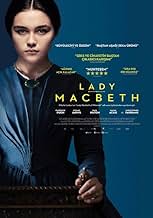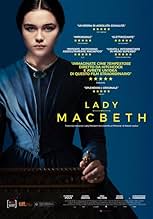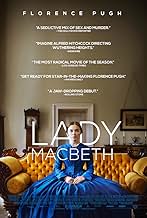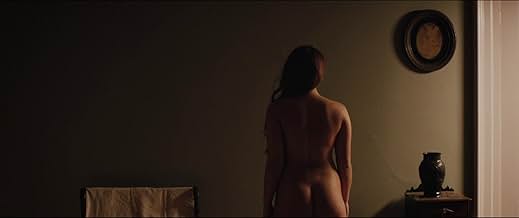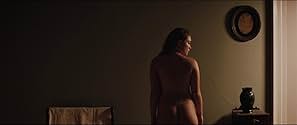In 19th-century rural England, a young bride who has been sold into marriage discovers an unstoppable desire within herself as she enters into an affair with a worker on her estate.In 19th-century rural England, a young bride who has been sold into marriage discovers an unstoppable desire within herself as she enters into an affair with a worker on her estate.In 19th-century rural England, a young bride who has been sold into marriage discovers an unstoppable desire within herself as she enters into an affair with a worker on her estate.
- Nominated for 2 BAFTA Awards
- 24 wins & 58 nominations total
Kema Sikazwe
- Farmhand
- (as Kema Slkazwe)
- Director
- Writers
- All cast & crew
- Production, box office & more at IMDbPro
Storyline
Did you know
- TriviaFlorence Pugh said she loved her nude scenes in this film. Pugh reflected on her breakout role during an interview for Britain's ES Magazine and admitted the part "changed everything" for her. "I loved the fact she was naked all the time. At that point in my life, I had been made to feel shit about what I looked like and that film was perfect. There was no room for me to feel insecure."
- GoofsA Cornish Rex cat first appears at 14:30. The breed first appeared around 1950.
- ConnectionsFeatured in The EE British Academy Film Awards (2018)
- SoundtracksPraise to the Lord, the Almighty
(uncredited)
German folk tune
Lyrics by Joachim Neander, translated by Catherine Winkworth
Featured review
Lust and loneliness
If I were the producer of this film, I'd have chosen a different title. I'm sure lots of moviegoers are going to be misled: this film has nothing to do with Shakespeare. It's an adaptation of a novel by the Russian author Nikolai Leskov, set in early 19th century England.
The film seems to be a pre-feminism manifesto for women's rights. It shows Katherine Lester, the submissive wife of a wealthy but abusive landowner, living in a secluded manor in the British countryside. During a prolonged absence of her husband, she rediscovers her freedom and starts an affair with one of the stable boys. Not willing to give up her newly acquired status, she starts a series of increasingly extreme actions.
The interesting thing is how Katherine evolves from victim to culprit. She seems to have learned from her husband how to use and misuse power. The lack of social conscience of which she at first is a victim, becomes a driving force for her own behaviour. Her selfishness and lack of morality is so extreme that, in the end, she betrays innocent servants. The viewer has to shift his allegiances: at first, it's impossible not to sympathize with Katherine, enjoying a free life without her heartless husband. But halfway through the film, it becomes clear that Katherine is just as heartless, as soon as she is in power.
The story is filmed in a very effective, sober style with beautiful cinematography. The lack of any music is remarkable: some elongated scenes are striking because of the silence. The oppressive atmosphere in the manor is emphasized by the camera work. The camera repeatedly shows scenes from exactly the same viewpoint. Four or five times, we see the servant Anna entering Katherine's bedroom in exactly the same way.
As much as 'Lady Macbeth' is about gender, it is also about class. It is striking that Katherine, who as a woman is considered a lower form of human life by men, herself considers the servants to be a lower form of human life. She shamelessly uses them for her own purposes and enjoyment, but doesn't care at all about their fate afterwards.
'Lady Macbeth' is a beautiful film, about issues that even nowadays are worth thinking about. But I would have named it 'Lust and loneliness' - after all, it's set in the same period as the Jane Austen novels.
The film seems to be a pre-feminism manifesto for women's rights. It shows Katherine Lester, the submissive wife of a wealthy but abusive landowner, living in a secluded manor in the British countryside. During a prolonged absence of her husband, she rediscovers her freedom and starts an affair with one of the stable boys. Not willing to give up her newly acquired status, she starts a series of increasingly extreme actions.
The interesting thing is how Katherine evolves from victim to culprit. She seems to have learned from her husband how to use and misuse power. The lack of social conscience of which she at first is a victim, becomes a driving force for her own behaviour. Her selfishness and lack of morality is so extreme that, in the end, she betrays innocent servants. The viewer has to shift his allegiances: at first, it's impossible not to sympathize with Katherine, enjoying a free life without her heartless husband. But halfway through the film, it becomes clear that Katherine is just as heartless, as soon as she is in power.
The story is filmed in a very effective, sober style with beautiful cinematography. The lack of any music is remarkable: some elongated scenes are striking because of the silence. The oppressive atmosphere in the manor is emphasized by the camera work. The camera repeatedly shows scenes from exactly the same viewpoint. Four or five times, we see the servant Anna entering Katherine's bedroom in exactly the same way.
As much as 'Lady Macbeth' is about gender, it is also about class. It is striking that Katherine, who as a woman is considered a lower form of human life by men, herself considers the servants to be a lower form of human life. She shamelessly uses them for her own purposes and enjoyment, but doesn't care at all about their fate afterwards.
'Lady Macbeth' is a beautiful film, about issues that even nowadays are worth thinking about. But I would have named it 'Lust and loneliness' - after all, it's set in the same period as the Jane Austen novels.
- How long is Lady Macbeth?Powered by Alexa
Details
- Release date
- Country of origin
- Official sites
- Language
- Also known as
- Леді Макбет
- Filming locations
- Lambton Castle, Chester-le-Street, County Durham, England, UK(The Lesters' home)
- Production companies
- See more company credits at IMDbPro
Box office
- Budget
- £500,000 (estimated)
- Gross US & Canada
- $1,129,408
- Opening weekend US & Canada
- $64,537
- Jul 16, 2017
- Gross worldwide
- $5,343,632
- Runtime1 hour 29 minutes
- Color
- Aspect ratio
- 2.39 : 1
Contribute to this page
Suggest an edit or add missing content







